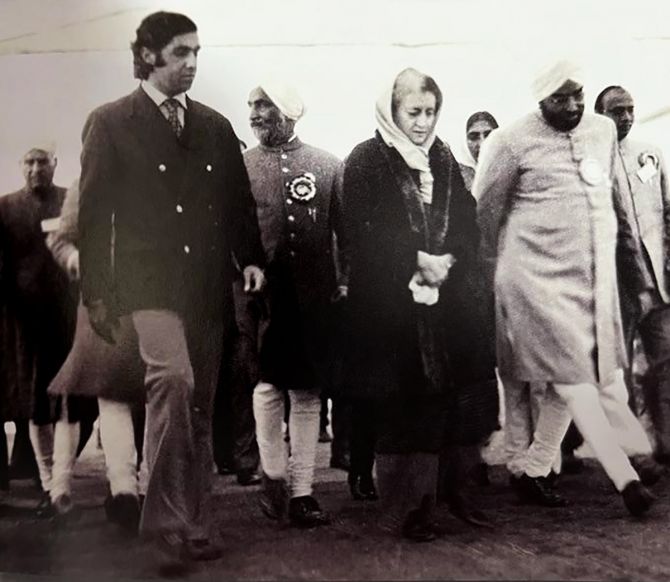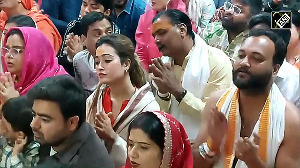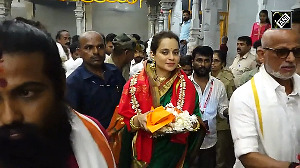'The politics that is now being played in Punjab doesn't contribute towards peace and tranquillity.'

"The Sikh's psyche is such that if you continue fighting them or try to suppress them, they will fight back," says retired IAS officer Ravi Sawhney, who was deputy commissioner during Jarnail Singh Bhindranwale's arrest in Ludhiana and served for two decades in Punjab.
"Then prime minister Indira Gandhi was advised against negotiating with them. I think she was totally ill advised," says Mr Sawhney, who subsequently worked for nearly 20 years with the United Nations Economic and Social Commission for Asia and the Pacific.
Belonging to an older and vanishing tribe of IAS officers, Mr Sawhney has written an engaging memoir Living a Life which gives a fascinating account of a rich professional experience with warm vignettes from his personal life.
"One has to find ways where one line of thought is not dominant in the state. Diversity has to be respected in a democracy," Mr Sawhney says in the second part of his interview to Rediff.com's Archana Masih discussing the Punjab conflict of the early 1980s and decisions that could have prevented the cataclysmic events thereafter.
You write about two instances that provided the opportunity to maybe end the Punjab conflict, both of which did not yield positive results which, according to you, exemplified how the Government of India did not understand Sikh psyche.
Do you feel successive governments, including the BJP, have understood Punjab?
The people of Punjab have proven that they are nationalists. They have made a major contribution to India's economic growth and in the armed forces.
Punjab has made the sacrifices and has suffered the violent effect of Partition because it is a border state. Yet, in spite of that, it was till recently among the better developed and administered states.
Unfortunately, over the recent past, the political situation has been somewhat volatile, and the politics that is now being played doesn't contribute towards peace and tranquillity.
The Sikh's psyche is such that if you continue fighting them or try to suppress them, they will fight back.
Then prime minister Indira Gandhi was advised against negotiating with them. I think she was totally ill advised.
A rapprochement between the Akali Dal and the Congress -- which were the two major parties at that time -- would have definitely contributed towards political stability and would have marginalised and diminished Bhindranwale and put an end to extremism, possibly Operation Blue Star and the tragic events in its aftermath.
Bhindranwale was getting his energy and fuel from this agitation.

And that is why Parkash Singh Badal was keen to secretly meet someone from the Gandhi family during the Akali's Jail Bharo movement?
Badal was keen to have a discussion and as I write in my book, he said that their [Akalis] detention did not mean that they had been vanquished.
He felt that if they did not succeed as moderates, 'then the coward sitting in the Golden Temple will gain ascendancy.'
It was unfortunate that his point of view was not appreciated at the Centre.
Then, a second attempt was made in Delhi. I was there when then finance minister Pranab Mukherjee came late one night and was shown the agreement that had been prepared. He said it looked good and he would 'show it to madam', but I think the advisors around her at that time rejected it.
One has to find ways where one line of thought is not dominant in the state. Diversity has to be respected in a democracy.
And like you say, maybe, if this had come through the course of history could have been different?
Yes, if Bhindranwale had been marginalised, there would have been no Operation Blue Star by the Indian Army.
There was an earlier opportunity to taken action inside in the Golden Temple which could have been undertaken by the police, not the army.
After the assassination of DIG A S Atwal on the steps of the Golden Temple in 1983?
Yes. He was a devout Sikh who was assassinated when he went to the Golden Temple to pray. People were definitely hurt with the killing and the public felt it was wrong.
It provided an opportunity to take police action against Bhindranwale and his supporters ensconced within the temple.
I had asked Chief Minister Darbara Singh when he came to Ludhiana a few days later that why did we not use the opportunity to take action and he said all decisions were made by Delhi.
Ramesh Inder Singh, who was later the district commissioner of Amritsar, said Mr Atwal's body was not removed for two hours because of the back and forth of orders between Punjab and Delhi.
It was unfortunate that the state government was not in a position to deal with the situation with the confidence that the Centre would support them.
What makes you believe that if action was taken by the Punjab police against Bhindranwale earlier, it would have turned the sentiment against the terrorists and prevented the cataclysmic events that happen after Operation Blue Star?
The Sikhs are very pious and religious people. Public perception would definitely have been in favour of taking some action on those who perpetuated the crime of killing a Sikh when he went to pray inside the Golden Temple.
It would have been a police action. Under the Indian Constitution, the army can only be called when the civil administration asks for assistance.
But unfortunately, in Operation Blue Star, the army completely took over. As Ramesh Inder Singh says in his book, all means of communication had been cut off.
Unfortunately, it was a complete army takeover and this was not the way it should have been done.
Feature Presentation: Aslam Hunani/Rediff.com











 © 2025
© 2025